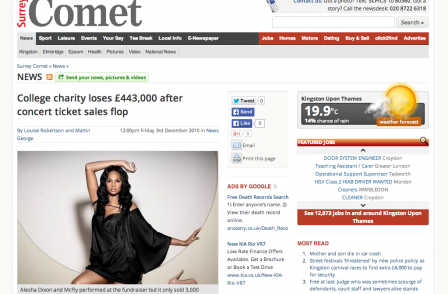
The Surrey Comet is one of several local newspapers to beat the EU’s ‘right to be forgotten’ ruling by running a story about a request to Google to remove this article from search results.
The paper revealed on Friday that a mystery person succeeded in getting the search engine to partially remove links to their archive.
The original article was about a college losing more than £400,000 on a fundraising concert.
After republishing the story it has now re-entered the search results – and has received a fresh blast of publicity.
The Comet has not yet discovered who made the take-down request. Google won’t say.
But other media can use the same tactic, provided they make legal checks.
I can foresee media websites running regular features like: "Today’s take-down requests: the stories people didn’t want you to see."
If enough of them adopted this tactic, people would hesitate to issue take-down requests because they would be counter-productive.
If you’re consider using this tactic, it’s safest to just re-use the link.
But if you want to republish information from the archived article, make sure you do not:
1. Repeat a libel.
2. Include content from the original article that prejudices new court proceedings, or a retrial.
3. Breach the Rehabilitation of Offenders Act by referring to a spent conviction.
4. Breach the PCC code by republishing a story that was subject to an unfavourable adjudication.
5. Refer to a ‘convict’ who has since been cleared on appeal.
6. Name someone whose identity has since been restricted.
7. Repeat facts from privileged copy that have subsequently changed.
8. Re-publish old court copy, or privileged stories, ‘for the sake of it’. This could be seen as malicious.
9. Insensitively repeat information about deaths, tragedies etc.
10. Breach copyright.
11. Contain personal information, unless there is a current public interest issue.
Cleland Thom is author of the new eBook: Internet law for journalists
Email pged@pressgazette.co.uk to point out mistakes, provide story tips or send in a letter for publication on our "Letters Page" blog
